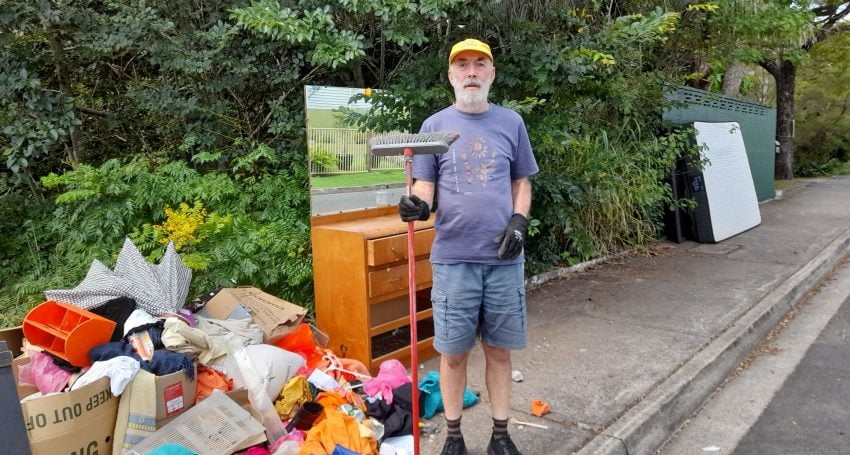“These weather events are turning points in people’s lives”
Features
“We moved stuff upstairs. The lights went out. We headed for higher ground, and there we stayed for five days. We were lucky because we had just a couple of inches of water in the rooms we had emptied. Our neighbours, a few metres down the hill, were not so lucky,” says Jon Eastgate from St Andrew’s, South Brisbane

It rained. And rained. It rained more. The Brisbane River was rising. There would be minor flooding. It rained more. Actually, it would be moderate. More rain. No, sorry, major.
We moved stuff upstairs. The lights went out. We headed for higher ground, and there we stayed for five days. We were lucky because we had just a couple of inches of water in the rooms we had emptied. Our neighbours, a few metres down the hill, were not so lucky. The rain then headed south, wreaking havoc wherever it went.
The home we live in now flooded in 1974, years before we came. In the 2011 flood, we had over a metre of water on our property and had to spend two weeks living with my sister while we cleaned up. In 2022 we only had a couple of inches of water downstairs. My neighbour two doors down has it much worse. He lived through both the 1974 and 2011 floods. This year he had water through his main living area again and will be living with friends for months while his house is repaired for a third time.
We have known for decades now that damage to the climate is a major contributor to the more frequent and intense extreme weather events, such as heatwaves, droughts (and associated bushfires) and floods. This is what we have been living through in the past decade – the 2011 floods, the freak storm in 2014, the 2019 bushfires and now more floods.
These weather events are turning points in people’s lives. If you are in the path of a flood, a bushfire or a super-storm you are likely to suffer property damage and loss. You may be rendered temporarily or permanently homeless. Some lose their lives.
Advertisement
These events also take a huge psychological toll. You find yourself pacing nervously with every thunderstorm, obsessively checking the weather reports and lying sleepless while the rain falls. The world suddenly seems a more dangerous and unpredictable place.
Yet these events are also seminal in community life, showing how locals band together in compassion and solidarity. Over the past few weeks our local social media groups have been full of posts with people saying what they need and neighbours responding quickly by turning up to help with cleaning, lifting, lending equipment, donating furniture or whatever is required.
It’s easy for us to get absorbed in the day-to-day issues and these are very important. However, as followers of Jesus we need to also reflect on how the climate and environmental degradation relate to our calling.
When it comes down to it, the environmental issues we are facing now are the result of greed. We are called to repent of our constant desire for more and for our indifference to our fellow humans and to God’s wider creation. This repentance is not simply individual because these actions and attitudes are embedded in our social and economic systems.
Advertisement
Repentance without change is shallow. We need to begin to turn away from our greed and selfishness and turn towards generosity and compassion.
This can start by providing aid for those affected by environmental disasters, both those right next door and those around the world – in poor communities where the impacts are even greater and the resources to respond much more meagre.
We also need to make changes in our own personal lifestyles – consuming only what we need; being generous with our resources if we are well off; reducing our ecological footprint by reducing power use and switching to clean energy sources; using public and active transport where possible; investing our superannuation ethically, and so much more.
As churches we can do the same collectively, using our roofs to generate solar power and encouraging people to cycle, catch the bus or car pool to church, placing the care of God’s creation at the heart of our practices.
Finally, while all these individual and community actions are important, we also need political and corporate change. We need our governments and major corporations, in Australia and around the world, to move rapidly to limit damage to the climate, for example by investing in clean energy infrastructure and shifting away from polluting coal. We can let our elected Members of Parliament know what change we want to see.
Christians can be a powerful voice working for change, both through our church institutions and through multi-faith or ecumenical groups like Australia’s Religious Response to Climate Change and Common Grace.
It can be easy to despair and even easier to stick our heads in the sand. However, if we choose to do so, we can limit the damage, while responding justly and compassionately to vulnerable people impacted by our behaviours. As followers of the God of love and justice, we are called to care for creation, including for each other.





